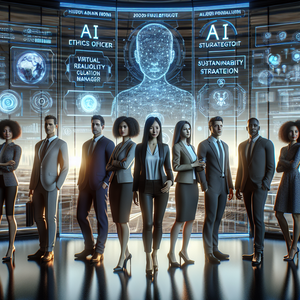Jobs Beyond the Horizon: The Future Landscape of Work

As global awareness of climate change and environmental issues continues to grow, companies are increasingly prioritizing sustainability in their operations. This shift has led to the rise of sustainability officers—professionals tasked with developing and implementing strategies that minimize environmental impact.
Responsibilities and Skills Required
Sustainability officers may engage in a variety of responsibilities, including conducting sustainability audits, developing eco-friendly practices, and ensuring compliance with environmental regulations. They serve as vital liaisons between corporate goals and environmental stewardship. To thrive in this role, candidates typically require a blend of education in environmental science, business management, and policy analysis. Practical experience, such as internships or volunteer work with environmental organizations, can also be invaluable. As sustainability becomes a core aspect of corporate strategy, the demand for skilled sustainability officers is expected to surge. According to the World Economic Forum, the green economy is projected to create millions of new jobs globally, underscoring the importance of this role.
The Emergence of AI Ethicists
Artificial intelligence is rapidly reshaping the way businesses operate, but with great power comes great responsibility. As AI technologies become more integrated into everyday life, the need for AI ethicists is becoming increasingly critical. These professionals are responsible for addressing the ethical implications of AI deployment, ensuring that technologies are developed and used in ways that are fair, transparent, and accountable.
Diverse Backgrounds and Educational Pathways
AI ethicists often come from diverse backgrounds, including philosophy, computer science, and law. As the field matures, universities are beginning to offer specialized courses in AI ethics, preparing the next generation to tackle complex dilemmas such as bias in algorithms and data privacy concerns. The demand for AI ethicists will only grow as more organizations implement AI solutions and seek to navigate the associated ethical challenges. For instance, as companies like Google and Microsoft ramp up their AI initiatives, they are simultaneously investing in ethical oversight, highlighting the importance of this emerging role.
Remote Wellness Coordinators: A New Approach to Employee Well-Being
The pandemic has fundamentally altered the landscape of work, leading to a rise in remote and hybrid work models. With this shift, companies are recognizing the importance of employee well-being and mental health. Enter the remote wellness coordinator—a role designed to promote health and wellness in virtual settings.
Focus on Employee Well-Being
These professionals may organize wellness programs, provide mental health resources, and create a supportive online community for remote employees. To excel in this position, candidates should possess a background in psychology, health promotion, or human resources. Certifications in wellness coaching or mental health first aid can also enhance credibility. As organizations continue to adapt to remote work, the importance of employee wellness coordinators will only increase. A study by the American Psychological Association found that employee wellness programs can significantly reduce healthcare costs and increase productivity, further emphasizing the role's value in modern workplaces.
Skills and Education for the Future
As these emerging roles illustrate, the future job market will require a unique set of skills and knowledge. Adaptability, critical thinking, and a commitment to lifelong learning will be essential for success. Educational institutions are beginning to respond to these needs by offering innovative programs that incorporate interdisciplinary approaches, fostering skills that align with the demands of future careers. Moreover, pursuing continuous professional development through workshops, online courses, and certifications will be crucial for job seekers looking to stay competitive. By investing in their skill sets, individuals can position themselves as valuable assets in the evolving job market. The World Economic Forum estimates that by 2025, 85 million jobs may be displaced by a shift in labor between humans and machines, but 97 million new roles could emerge that are more adapted to the new division of labor.
The job landscape of the next decade promises to be vibrant and dynamic, shaped by advancements in technology, a commitment to sustainability, and a focus on employee well-being. Roles such as sustainability officers, AI ethicists, and remote wellness coordinators exemplify the exciting opportunities that await. By understanding the skills and educational paths required for these positions, individuals can prepare themselves to thrive in a world that is increasingly focused on innovation and responsibility. Embracing change and investing in personal growth will be the keys to unlocking a successful and fulfilling career in the years to come. As we look beyond the horizon, it is clear that the future of work is not just about surviving the changes—it’s about thriving in an environment that values adaptability, ethics, and well-being.
Sustainability Consultant
Environmental consulting firms, corporate sustainability departments, NGOs focused on climate action
Core Responsibilities
Conduct environmental assessments and audits for businesses to identify areas for improvement.
Develop and implement sustainability strategies that align with corporate goals and regulatory requirements.
Educate stakeholders on sustainability practices and foster a culture of environmental responsibility.
Required Skills
Strong analytical skills to interpret environmental data and propose actionable solutions.
Knowledge of environmental regulations and sustainability frameworks (e.g., LEED, ISO 14001).
Excellent communication and presentation skills to engage diverse audiences.
AI Product Manager
Tech companies (e.g., Google, Amazon), startups focused on AI applications, software development firms
Core Responsibilities
Oversee the development and implementation of AI-driven products, ensuring they meet user needs and ethical standards.
Collaborate with data scientists and engineers to define product requirements and prioritize features.
Analyze market trends and user feedback to drive product improvements and innovations.
Required Skills
Strong background in both technology (understanding of AI and machine learning concepts) and business (product lifecycle management).
Excellent problem-solving and critical-thinking skills to address complex challenges.
Familiarity with ethical considerations in AI, including bias mitigation and data privacy.
Remote Employee Engagement Coordinator
Corporations with remote teams, HR consulting firms, tech companies embracing hybrid work models
Core Responsibilities
Design and implement virtual team-building activities and wellness programs to foster a positive remote work culture.
Monitor employee satisfaction and engagement levels, using surveys and feedback sessions to inform strategies.
Collaborate with HR to develop policies that support remote work and well-being.
Required Skills
Strong interpersonal and communication skills to connect with remote employees effectively.
Experience in HR or organizational psychology to understand employee needs and motivation.
Creativity and resourcefulness in developing engaging and inclusive online experiences.
Environmental Policy Analyst
Government agencies, think tanks, environmental advocacy organizations
Core Responsibilities
Research and analyze environmental policies and regulations to assess their impact on businesses and communities.
Provide recommendations to government agencies or NGOs on policy development and advocacy strategies.
Monitor legislative developments and advocate for sustainable practices at local, state, or national levels.
Required Skills
Strong analytical skills with the ability to interpret complex regulations and data.
Excellent writing and presentation skills to communicate findings and recommendations clearly.
Knowledge of environmental law, public policy, and stakeholder engagement strategies.
Corporate Social Responsibility (CSR) Manager
Large corporations, nonprofit organizations, consulting firms specializing in CSR strategies
Core Responsibilities
Develop and oversee CSR initiatives that align with the company's values and community needs.
Engage with stakeholders, including employees, customers, and local communities, to promote corporate citizenship.
Measure and report on the impact of CSR activities, ensuring transparency and accountability.
Required Skills
Strong project management skills to lead multiple initiatives simultaneously.
Excellent communication and relationship-building skills to engage diverse stakeholders.
Knowledge of sustainability practices and social impact measurement methodologies.


